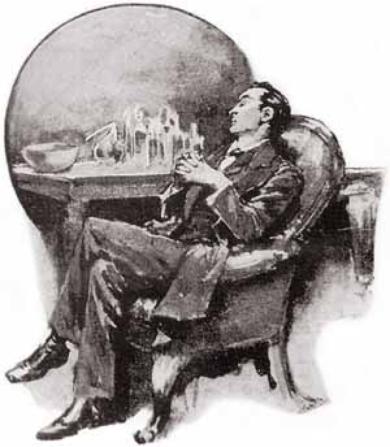I left him then, still puffing at his black clay pipe, with the conviction that when I came again on the next evening I would find that he held in his hands all the clues which would lead up to the identity of the disappearing bridegroom of Miss Mary Sutherland.
A professional case of great gravity was engaging my own attention at the time, and the whole of next day I was busy at the bedside of the sufferer. It was not until close upon six o'clock that I found myself free and was able to spring into a hansom and drive to Baker Street, half afraid that I might be too late to assist at the dénouement of the little mystery. I found Sherlock Holmes alone, however, half asleep, with his long, thin form curled up in the recesses of his armchair. A formidable array of bottles and test-tubes, with the pungent cleanly smell of hydrochloric acid, told me that he had spent his day in the chemical work which was so dear to him.
 Sherlock Holmes alone, however, half asleep"/>
Sherlock Holmes alone, however, half asleep"/>
"Well, have you solved it?" I asked as I entered.
"Yes. It was the bisulphate of baryta."
"No, no, the mystery!" I cried.
"Oh, that! I thought of the salt that I have been working upon. There was never any mystery in the matter, though, as I said yesterday, some of the details are of interest. The only drawback is that there is no law, I fear, that can touch the scoundrel."
"Who was he, then, and what was his object in deserting Miss Sutherland?"
The question was hardly out of my mouth, and Holmes had not yet opened his lips to reply, when we heard a heavy footfall in the passage and a tap at the door.
"This is the girl's stepfather, Mr. James Windibank," said Holmes. "He has written to me to say that he would be here at six. Come in!"
The man who entered was a sturdy, middle-sized fellow, some thirty years of age, clean-shaven, and sallow-skinned, with a bland, insinuating manner, and a pair of wonderfully sharp and penetrating grey eyes. He shot a questioning glance at each of us, placed his shiny top-hat upon the sideboard, and with a slight bow sidled down into the nearest chair.
"Good-evening, Mr. James Windibank," said Holmes. "I think that this typewritten letter is from you, in which you made an appointment with me for six o'clock?"
"Yes, sir. I am afraid that I am a little late, but I am not quite my own master, you know. I am sorry that Miss Sutherland has troubled you about this little matter, for I think it is far better not to wash linen of the sort in public. It was quite against my wishes that she came, but she is a very excitable, impulsive girl, as you may have noticed, and she is not easily controlled when she has made up her mind on a point. Of course, I did not mind you so much, as you are not connected with the official police, but it is not pleasant to have a family misfortune like this noised abroad. Besides, it is a useless expense, for how could you possibly find this Hosmer Angel?"